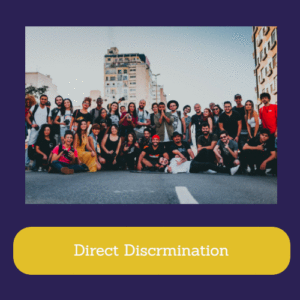 Direct discrimination occurs when you’re treated worse than someone else for specific reasons.
Direct discrimination occurs when you’re treated worse than someone else for specific reasons.
Under the Equality Act 2010, it’s referred to as being treated ‘less favourably’ because of protected characteristics.
To be connected to a specialist discrimination solicitor near to where you live or work, please either call us now on 0845 1391399 or complete a Free Online Enquiry.
These characteristics include:
- Age
- Sex
- Gender reassignment
- Sexual orientation
- Race
- Religion or belief
- Disability
- Pregnancy and maternity
- Marriage or civil partnership
What Is Direct Discrimination?
Direct discrimination might be hard to understand if you’re not familiar with the legal definition – which, let’s be honest, is most people!
But it’s important to know that not ALL unfair treatment is classed as unlawful discrimination under the Equality Act.
It’s only unlawful discrimination IF you’re treated differently (or unfairly) because of a protected characteristic, as outlined above.
However, when it comes to the actual treatment, intent isn’t a consideration under the law. In fact, it doesn’t matter at all if the person who has treated you differently didn’t intend to discriminate against you or if they didn’t realise that they were discriminating at all.
If you’re treated differently because of a protected characteristic, it’s classed as direct discrimination – no matter the intent.
Direct Discrimination Meaning
Direct discrimination is where you’re treated less favourably because of a protected characteristic. Whether that’s age, race, gender reassignment, pregnancy or anything else, it’s classed as direct discrimination.
Once you raise a formal grievance because of discrimination, there’s a procedure that all employers should follow.
Acas sets out a code of practice relating to discrimination, although most employers should have their own grievance procedure in place.
There must be an investigation to ensure that all information is brought forward, and employers can bring a relevant person to a grievance meeting – that might be a legal presentative, union representative, or someone from the Citizen’s Advice Bureau.
It’s worth noting that any grievances should be raised as soon as possible, particularly when it relates to discrimination as this is a particularly sensitive and serious issue.
Direct Discrimination Examples
An example of direct discrimination might be if you’re a woman who is working as an account manager when a new client joins…
But you’re then moved to a non-client-facing role because the client only wishes to work with men. This is less favourable (or different) treatment purely on the basis of your sex, which is direct discrimination.
In fact, even if your employer compensated you with other opportunities, a bonus, or a pay increase, it would still be classed as discrimination because they’re evidently aware that it’s an issue and they are attempting to make up for it.
Direct discrimination can occur against any of the protected characteristics and it might happen during the hiring process, it might be denying someone a promotion or it could simply be not affording someone the same opportunities.
When Is Direct Discrimination Acceptable?
Short answer? NEVER!
The Equality Act is incredibly clear when it comes to direct discrimination – there are no acceptable circumstances because of the way in which it is defined.
Direct Discrimination Solicitors Near Me
At Solicitors Near Me, we know how difficult direct discrimination can be to deal with.
And that’s why we’re here to help, with advice from expert direct discrimination solicitors.
We understand that you’re not only dealing with a difficult situation at work where you’ve been unfairly treated but that the legal process to challenge it can seem complicated and difficult to understand.
That’s where Solicitors Near Me can make a difference.
We connect you with expert employment discrimination solicitors near you for FREE so that you can get the help and advice you need with your grievance procedure – whether you’re in the process, considering it, or unsure what your best option is.
You’re under no obligation to press ahead with the solicitor we connect you with and until you decide to proceed, everything is completely FREE.
To be connected to a specialist discrimination solicitor near to where you live or work, please either call us now on 0845 1391399 or complete a Free Online Enquiry.
